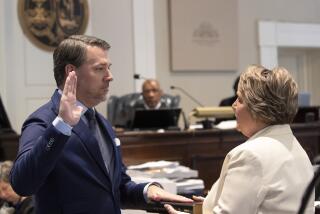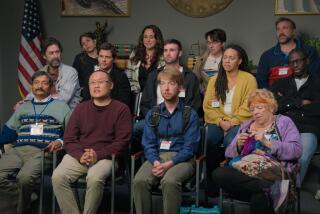PERSPECTIVE ON JUSTICE SYSTEM : Beware the ‘Hidden Persuaders’ : The increased use of jury consultants banks more on who can exploit the most biases, not winning cases on the evidence.
- Share via
In this year’s “trial of the century,” People vs. Simpson, jury consultants will assist both the prosecution and the defense. These consultants would like the public to believe that they help lawyers pick an unbiased jury. But their real job is to help lawyers pick a favorably biased jury and then exploit those biases in ways that are hidden from the jury. This use of jury consultants poses a threat to our justice system.
Jury consultants, who are behavioral scientists, know that there is no such thing as an unbiased juror. It is a given in modern psychology that humans cannot make decisions about evidence without relating to past experience and preconceived beliefs. Thus, a jury consultant identifies people who have hostile biases so they can be eliminated from a jury in favor of people who enter the courtroom programmed to favor the consultant’s client.
Consultants enable a lawyer to exploit bias in jury selection in ways so subtle that the jurors, judge and opposing lawyers may not know what is happening. For example, research by defense consultants in the Simpson case could reveal that a certain type of person, say middle-class female, is upset when it is suggested that Nicole Brown Simpson left her children alone to walk her dog on the night of the murders. Thus, while the judge and the prosecution focus during jury selection on racial and gender biases more obviously implicated in the case, information obtained from a consultant could help the defense seat a juror who otherwise may be open to bias against one of the victims.
The selection of a favorably biased jury is only the first part of the consultant’s job. The consultant then suggests what evidence to offer and how to package the evidence to take advantage of the jury’s biases. In the unguarded words of one consultant, “All in all, we help lawyers position their cases to juries in much the same way you would sell a bar of soap.” So if a consultant decides that a juror’s biases can be exploited by insinuations that the Simpson children were left alone, the power of these insinuations may be unclear to the judge, the prosecutor and even most of the jury. Yet it might have a strong effect on one key juror.
In fact, hiding these efforts from the jury is vital to their effectiveness. This is because jurors will be offended if they realize that a lawyer is attempting to select a biased jury or exploit bias at trial. The jury might even decide that the lawyer does not think he or she can win fairly. To avoid this, appeals to bias will be subtle and the lawyers will repeatedly assure the jurors that they were selected because they are unbiased.
The legitimacy of the jury as an institution is based on two assumptions. The first assumption is that the jury will roughly reflect the values and biases of a representative cross-section of the people living in the community where the case is tried. This assumption is exploded to the extent that consultants can stack the jury with people who have a few idiosyncratic biases.
The second assumption is that the jury can competently evaluate evidence and see through most efforts by the advocates to distort the truth. This assumption is undermined when consultants enable lawyers to exploit juror biases in ways that are so subtle that even the jurors may not fully be aware of how and why they are being persuaded.
In their defense, jury consultants say that they just help lawyers do more effectively what lawyers have always tried to do. After all, long before the first Ph.D. set foot in a courtroom, trial lawyers were using intuition to psychoanalyze juries.
But lawyers with intuition pose fewer problems than those supported by scientists. Armed even with a keen intuition, the lawyer is still just one person not schooled in psychology, pitted against 12 jurors, a skeptical judge and a hostile opponent.
Anyone who doubts the impact of jury consultants has to explain why so many smart, experienced trial lawyers are spending thousands of dollars employing those consultants.
The impact of jury consultants comes at a bad time for our justice system. Skepticism about the jury system is high, fed by verdicts in high-profile cases that seem more a product of bias than the evidence. Perhaps our best response to the use of jury consultants is to increase the power of juries to think for themselves. Thus, reforms that improve the education and sophistication of jurors could help, as might jury instructions that warn about lawyers’ efforts to exploit bias.
Without some effort to level the playing field between lawyers and juries, advances in jury consultant techniques will ensure that the problem will only get worse.
More to Read
Sign up for Essential California
The most important California stories and recommendations in your inbox every morning.
You may occasionally receive promotional content from the Los Angeles Times.













